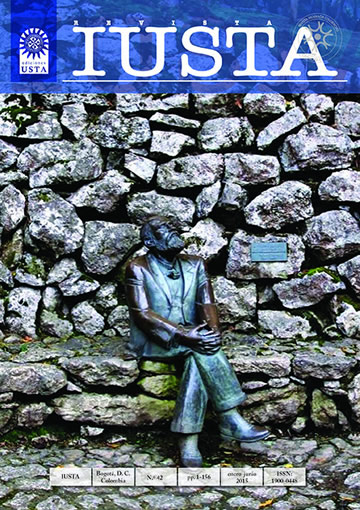Acceso a la justicia, regulación y colegiación de los abogados: relaciones
Access to justice and regulation and licensing of lawyers: relations
Abstract (en)
This paper aims to analyze the legal consequences from the absence of an effective,comprehensive and specific regulation of the legal profession (as well as the lack of
a comprehensive and compulsory formal licensing), as part of an effect on access to
justice, saw this as a fundamental right of social and political ethics and democratic
rule of law pillar as part of the core of other essential rights such as due process and
equality. In this sense, the research problem to be solved is if it affects the right of
access to justice by the absence of a fellowship of lawyers in Colombia.
To that end, we try to determine what we mean by nature subjective right and
lining in that context access to justice. Then we try to define or try to shape the
essential and distinguishable features of the fundamental right of access to justice;
then through concrete situations of judicial activity outreach we need for the
existence of a clear, decisive and effective legal regulation (including a mandatory
membership), as prerequisite for the realization of access to justice, this basis in
determining what is and has been the function of a legal regulation of the legal
profession and compulsory membership, and its alleged importance and interest
for the realization of the right of access to justice for the general public. We hold
that a non-unionized, unprotected without a body trained lawyer, develop ethical
control and exercise control to professional litigant, makes nullifying human rights
in the context of judicial activity, particularly access to justice, in such conditions
is a mere statement.
Abstract (es)
References
Aragués, M. Á. (2012). Informe sobre la viabilidad de una colegiatura obligatoria de los abogados en Colombia. Ministerio de Justicia sobre la colegiatura en Colombia. Disponible en http://www.abogacia.es/2012/10/19/informe-sobre-la-viabilidad-de-una-colegiaturaobligatoria-de-los-abogados-en-colombia/
Corte Constitucional. (1995). Sentencia C- 084. Bogotá,Colombia.
Corte Constitucional. (2002). Sentencia C-1027. Bogotá, Colombia.
Corte Constitucional. (1992). Sentencia C-543. Bogotá, Colombia.
Corte Constitucional. (1994). Sentencia T- 172. Bogotá, Colombia.
Corte Constitucional. (1992). Sentencia T-597. Bogotá, Colombia.
Corte Constitucional. (2012). Sentencia C-334. Bogotá, Colombia.
Corte Constitucional. (2007). Sentencia C-884. Bogotá, Colombia.
Corte Constitucional. (1994). Sentencia C-351. Bogotá, Colombia.
García, M. (2010). Sociología de la profesión jurídica. En Los abogados en Colombia. Universidad Nacional.
Moreno, L. J. (2000). Acceso a la Justicia. Bogotá, Colombia: Ediciones Academia Colombiana de Jurisprudencia, colección portables.
Rabinovich, R. (2013). ¿Cómo se hicieron los derechos humanos? Un viaje por la historia de los principales derechos de las personas. Los derechos existenciales, 1, 32. Ediciones Didot.
How to Cite
License
IUSTA Journal is under license Creative Commons Atribución-NoComercial-CompartirIgual 4.0 Internacional (CC BY-NC-SA 4.0)







